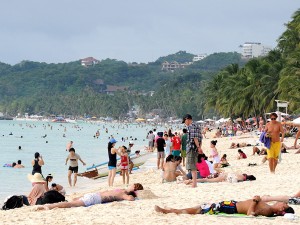
The country’s No. 1 tourist draw Boracay Island. Lowering the threshold of employment requirement to a more reasonable number “will allow smaller investments to come in and go into industries like tourism, which will facilitate the entry of more foreign nationals and investments,” says the Joint Foreign Chambers. FILE PHOTO
MANILA, Philippines—The Joint Foreign Chambers has urged lawmakers to pass amendments to the Foreign Investments Act that will allow more foreign nationals to practice in the Philippines and make it easier for more foreign investors to set up shop in the country.
In a statement, JFC stressed that the “practice of professions is not a germane provision in the Foreign Investment Negative List (FINL), a document created by the Foreign Investment Act. The FINL is intended to catalogue limitations on foreign equity in non-banking business sectors.”
“The constitution creates a policy bias in favor of Philippine citizens, but not a strict legal barrier to the participation of foreign professionals,’” the group explained.
According to the JFC, there are 47 laws governing specific professions, and 42 contain “reciprocity” provisions allowing foreigners to practice their profession in the Philippines, provided their countries of origin also allow Filipino professionals to practice there.
A Supreme Court rule, meanwhile, limits the practice of law to Philippine nationals. Four laws regulating criminologists, foresters, pharmacists, and radio and X-ray technologists also state that these professions are restricted to Philippine nationals and contain no reciprocity provision, it added.
“Considering that certain laws governing each profession allow foreign nationals to practice in the Philippines under reciprocity arrangements, it is extremely misleading to include such item in the FINL as a nationalized activity. This effectively discourages foreign professionals who could otherwise be allowed to practice here by virtue of reciprocity from working in the Philippines and sharing their ideas and technical know-how, contrary to the inclusive policy of the [Foreign Investments Act],” the group stressed.
Meanwhile, the JFC noted that the existing Foreign Investment Act allows 100-percent foreign ownership in domestic market activities above a minimum investment of $100,000 for those with advanced technology or have at least 50 employees, or otherwise $200,000.
“Operationally speaking, a $100,000 enterprise—only a little over P4.3 million—cannot immediately sustain a labor force of 50 persons. When the law was enacted in 1991, the minimum wage in the National Capital Region was P142 and today, it is P466. P4.3 million is not enough to sustain a labor force of 50 persons at the current minimum wage,” the JFC explained.
“So as not to render pointless this provision of the law, and to align it with the spirit of the FlA, there is a need to retain the employment requirement but lower the threshold to a more reasonable number. This will allow smaller investments to come in and go into industries like tourism, which will facilitate the entry of more foreign nationals and investments,” it added.
Lowering this threshold is expected to benefit the country’s tourism industry, as it will allow more foreign nationals to invest in small retail establishments to meet the cultural and dietary needs of these nationals such as the provision of foreign language guide services, putting up restaurants and the like.

